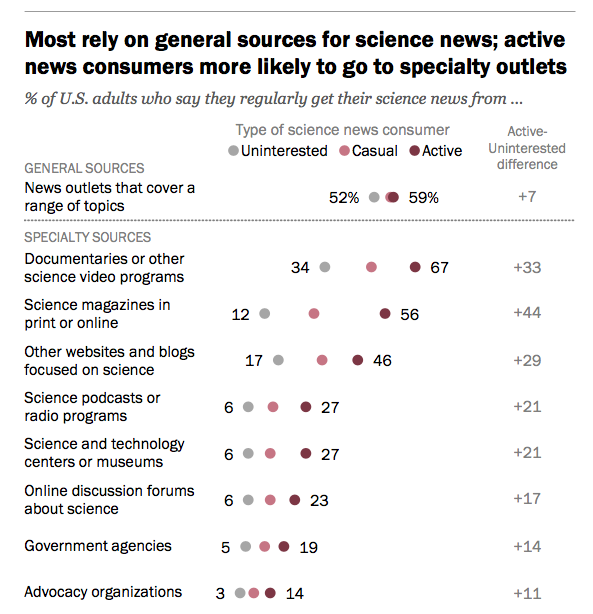Science publications, take note: 36 percent of U.S. adults get science news a few times in a week. Thirty percent say they actively look for science stories. But only 17 percent both seek out science news on their own and read science stories at least a few times every week.
Moreover, though people believe specialized sources (science video programming, science museums, science news magazines) are more accurate in their reporting of scientific developments, they’re still getting most of their science news from general interest outlets. These findings are taken from a Pew Research Center report published Wednesday, which analyzes results from a panel of 4,024 U.S. adults 18 or older surveyed between May and June of this year.

Even among people who actively seek out science news, a majority rely on general interest news outlets for it (54 percent). Among casual and uninterested science news consumers, 71 percent and 81 percent, respectively, get science stories from general news outlets.

What type of science news are Americans stumbling upon? 56 percent say they’ve seen stories on “scientific discoveries,” 48 percent say they’ve seen stories on “strange or weird scientific research findings,” and 41 percent say they’ve seen stories on “scientific findings that conflict with earlier research.”
And 37 percent say they’ve seen a science story that’s informed a personal health decision — which makes the spread of science- and health-related fake news even more concerning.

Speaking of fake news, 18 percent of the adults Pew surveyed reported ever seeing a science story they thought was “completely made up.” Common topics of those stories? Climate change and global warming (sigh), followed by space and alien life, evolution, and nutrition and food. Climate change was also the most common topic cited by those surveyed in the Pew report who reported ever seeing a news story that was reporting specifically on disagreements among scientific experts.
You can read about other findings in the full report, such as the differences in trust in various sources of scientific reporting across political affiliations, here.